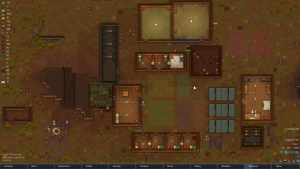Sandbox story telling
During my ongoing literature review I often discover interesting facts about things I’ve never thought about. Sometimes I can connect these facts with my own observations: The result is mostly a completely new idea why things are as they are. Maybe these ideas are new to you, too. Therefore I’ll share my new science based knowledge with you!
This week: This time, I think about the ’storyteller‘ game mechanic in RimWorld which tells the player a unique story every time the game is played.
The colony simulator RimWorld tells the story of a few survivors who survived a crash of their spaceship and are stranded on the surface of a different planet. The most impressive think of the game is its authenticity, as RimWorld simulates a very vivid and detailed world by utilizing many different variables that store a vast amount of information about the player’s virtual colony. However, despite the attention to detail, the game is still very enjoyable and does not overwhelm the player as it can be successfully played without managing every aspect of the game.

A RimWorld colony.
Aside from simulating an authentic world, the game tells a unique story every time it is played. In contrast to other sandbox games, RimWorld utilizes so-called ’storytellers‘ that generate random events on an irregular basis. As a result, the fate of the player’s colony does not only depend on the player’s decisions, but is also affected by the random events as well as their severity.
For instance, the storyteller can generate a severe attack of the colony. However, all attacks are different as they are completely randomized as well. In order to experience the depth of this game mechanic, I waited for such an event to occur and subsequently reloaded an autosave that was made just a couple of minutes before that event.
The first time, my colony was attacked by a group of animals that exploded and caused a spreading fire once they were killed. This resulted in a huge fire in the center of my colony which then burned down completely. The second time, my colony was attacked by a group of pirates who started a siege and, due to their large group, killed all my colonists. The third time, my colony was attacked by a group of mechanoids that can cause an incredible amount of damage over a very long range. The fourth time resulted in an attack of a group of boars which injured all my colonists but were easy to handle in contrast to the three other events.
In the end, the game told a different story each time I reloaded the autosave. From a player’s point of view, this approach results in a unique experience each time the game is played. In combination with the high amount of different variables that can be affected by the outcome of a random event, the game has always a different outcome.
In conclusion, providing random events that have a significant impact on the player’s gameplay results in a very strong and exciting experiences as the player can never predict what the outcome will be. Therefore, utilizing such a system can increase a sandbox game’s replayability and entertainment. However, the game should also include the option to disable the random events as nothing is more frustrating than seeing the own progress being destroyed.